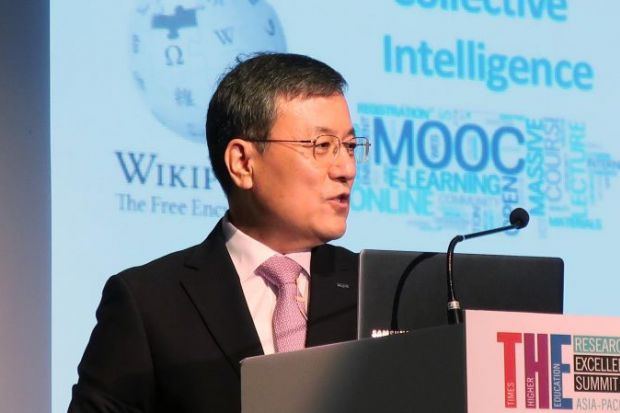Ongoing political interference in the appointments of university leaders in South Korea risks destroying trust between scientists and the government and hampering the country’s progress on research performance, sector figures have warned.
In November, the country’s Ministry of Science demanded that the Korea Advanced Institute of Science and Technology (KAIST) suspend its president, Shin Sung-chul, after alleging that he embezzled public research funds in his previous job as leader of the Daegu Gyeongbuk Institute of Science and Technology (DGIST).
One of the allegations centres on payments made by Professor Shin to the Lawrence Berkeley National Laboratory in California to secure access for South Korean scientists to one of its facilities.
Professor Shin, who was hired to lead KAIST in 2017 under the previous administration, has denied any wrongdoing, and the Berkeley Lab said in a letter sent to the ministry and seen by Times Higher Education that the agreement was lawful. A petition in support of Professor Shin, organised by the KAIST physics department, has collected more than 800 signatures from university researchers across South Korea.
KAIST’s board last month deferred a vote on whether to suspend Professor Shin. A spokeswoman said that the case was “now under investigation [by the Supreme Prosecutors’ Office], and we believe it will take time for a full investigation”.
But experts have said that the effort to remove Professor Shin is the latest episode in a long tradition of political interference in university governance.
An editorial in the Korea Herald on 17 December claims that since Moon Jae-in became president in May 2017, 11 heads of state-run research institutes and universities have resigned in the middle of their terms. All had been appointed during the previous government.
Jayden Kim, director of the Korean Association of Human Resource Development and a lecturer in human resource management at Republic Polytechnic in Singapore, said that heads of government-funded universities and research institutes in South Korea were routinely replaced before they completed their term whenever a new government came to power.
“Most of them have been under direct or indirect resignation pressure from the government,” he said. “It is a painful tradition of South Korea.”
He added that long-term research projects have also “often been discontinued by newly appointed presidents or chairmen of the regime”.
Dr Kim said that “continuity is absolutely imperative to conduct research projects at universities” and “an independent operating system should be established to guarantee the creativity and independence of research and to minimise the interference of bureaucrats”.
“If South Korea continues to follow the painful tradition of the past, it will be difficult for South Korea to achieve a better research performance than other advanced countries,” he added.
So Young Kim, head of the Graduate School of Science and Technology Policy at KAIST, said that it was “somewhat alarming” that the current left-leaning administration had continued this practice and “quite shocking” that some of the ministry’s allegations were based on a “misunderstanding of how an international collaboration takes place in scientific research”.
She expressed concern that “the whole process of trying to examine or reveal the possible faults of the people appointed in the previous government…risks [damaging] the trust of the scientific community”.
“Since research and development requires typically long-term investment and commitment, it is very hard to continue the research prioritised internally within any public research institute with relatively fast-changing heads,” she said.
Register to continue
Why register?
- Registration is free and only takes a moment
- Once registered, you can read 3 articles a month
- Sign up for our newsletter
Subscribe
Or subscribe for unlimited access to:
- Unlimited access to news, views, insights & reviews
- Digital editions
- Digital access to THE’s university and college rankings analysis
Already registered or a current subscriber? Login








